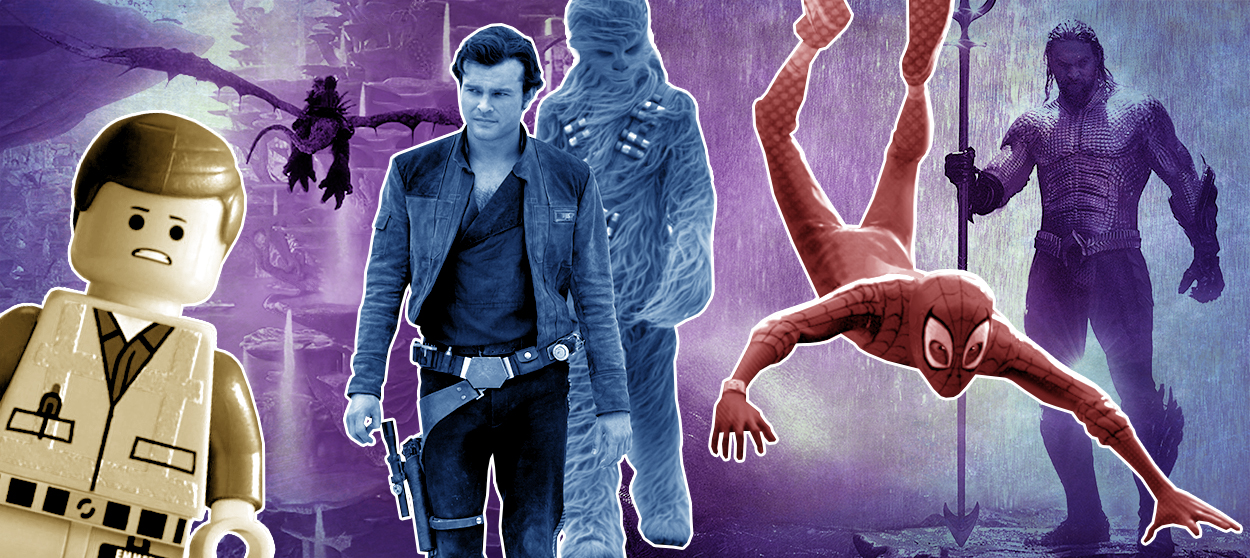Will these superhero and fantasy blockbusters ever get made? 2019 edition.
Is the era of the Hollywood 'universe' coming to an end?


A free daily email with the biggest news stories of the day – and the best features from TheWeek.com
You are now subscribed
Your newsletter sign-up was successful
Three years ago, I wrote a column called "Will these superhero and fantasy blockbusters ever get made?," which ran through the major movie franchises, and assessed the likelihood that we'd ever actually see the films the studio executives had already announced. For example, the third How to Train Your Dragon movie was, at the time, scheduled for May 2018, and I predicted that one would definitely get a release.
And I was right! Sort of. This weekend, the last part of the Dragon trilogy, How to Train Your Dragon: The Hidden World, arrives in U.S. theaters, after opening overseas in January. Granted, that's later than DreamWorks Animation had planned. Due to a long and expensive production, audiences around the globe are seeing The Hidden World nearly five years after How to Train Your Dragon 2.
But so far, the studio's patience has been rewarded. The Hidden World is already a huge hit in Australia, Brazil, and elsewhere, and is expected to do well in North America, too. The Dragon movies tend to be very good, so that's not surprising.
The Week
Escape your echo chamber. Get the facts behind the news, plus analysis from multiple perspectives.

Sign up for The Week's Free Newsletters
From our morning news briefing to a weekly Good News Newsletter, get the best of The Week delivered directly to your inbox.
From our morning news briefing to a weekly Good News Newsletter, get the best of The Week delivered directly to your inbox.
On the other hand, in that same "blockbuster odds" column, I wrote about what I assumed was another no-doubter DreamWorks release: The Croods 2, a follow-up to the hit 2013 prehistoric comedy. At the time, the sequel was set for November 2017; and given the time it takes to make big-budget animated features, I figured it was already close to finished. Instead, the project's been through several overhauls, and was briefly scrapped altogether after Universal Pictures bought DreamWorks. It now has a release date of September 2020 ... seven years after the original. By then, will anyone even remember The Croods?
The point of that original column was to argue that Hollywood studios were over-promising, perhaps trying to boost their stock value by announcing a steady flow of sure-fire crowd-pleasers, while ignoring how everything from unexpected production delays to changing public tastes might wreck their plans.
With another summer blockbuster season not too far away, I thought it'd be a good time to give all those same franchises a second look, and see which are motoring along, and which — in some cases as I predicted — have veered into a ditch.
1. The DC Extended Universe
A free daily email with the biggest news stories of the day – and the best features from TheWeek.com
Let's begin with a cautionary tale.
In 2016, Warner Bros. and DC Films had crazily ambitious plans, with nine Justice League and solo character movies scheduled through 2020, and four more in the works for unspecified dates. Four movies have been released — Suicide Squad, Wonder Woman, Justice League, and Aquaman — with Shazam! hitting theaters April 5. In further good news, all four of the released films have been massive money-makers, with Suicide Squad, Wonder Woman, and Aquaman doing so well they've already got sequels in the works.
But it'd be inapt to say everything's hunky-dory at DC. Justice League and its planned sequels/spin-offs were supposed to be the DCEU's anchors, similar to the way the Avengers movies work at Marvel. But while the first film sold a lot of tickets, it failed to generate any Avengers-style cultural excitement. Meanwhile, behind-the-scenes problems — and a general sense that DC had gone too far in making its pictures look heavy, dark, and artificial — has so far scuttled or delayed the Flash movie that was supposed to come out last year and the Cyborg and Green Lantern projects that had been slated for 2020.
In 2016, I gave very long odds to the prospect of us ever seeing a Booster Gold or Lobo movie; and I even put it at 4-1 that we'd even get a Justice League sequel. That proved prescient.
2. The Marvel Cinematic Universe/the Spider-verse/the X-verse
The Marvel juggernaut has continued to be unstoppable (not unlike Marvel's Juggernaut), with every film announced three years ago arriving more or less as scheduled, raking in piles of cash and generating audience goodwill. It's probably not a coincidence that Marvel's movie bosses have been cautious about overpromising. The studio and its Disney partners have three projects slated for this year: Captain Marvel, Avengers: Endgame and Spider-Man: Far from Home. Beyond that, while multiple projects are in various stages of pre-production, head honcho Kevin Feige has said they're waiting to see which makes the most sense to put where, for 2020 and beyond.
Meanwhile, one of Marvel Entertainment's other cinematic partners, Sony, has had hits with the Spider-Man universe movies Venom and the animated Into the Spider-Verse, both of which could get sequels and spin-offs. And 20th Century Fox has done well with its recent Marvel properties Logan and Deadpool, although the studio's also dealt with creative differences and delays on upcoming New Mutants, Gambit, and X-Force films.
Overall, the various big-screen Marvel universes seem remarkably well-managed, and healthy enough to survive for a long while. (Although if anyone's looking for signs of trouble, Netflix's recent cancellation of all of its Marvel TV shows may be an early warning of its audience's superhero-fatigue.)
3. Star Wars/Disney live action
Three years ago, Disney and Lucasfilm were basking in the success of The Force Awakens, and in the early stages of an aggressive strategy to release at least one movie a year, either as part of the ongoing Star Wars saga or as standalone "untold tales." At the time, Rogue One hadn't come out yet, and Solo hadn't started shooting. In my column, I expressed faith in the overall strength of the Star Wars brand, but wondered what would happen if any of of these pictures flopped.
Well, that was more or less the story of Solo, which had a troubled production and was a huge box office disappointment relative to expectations. Now the previously announced pipeline of anthology films is under extensive repair, with nothing new on the upcoming calendar. That said, Lucasfilm has commissioned some new Star Wars adventures: a trilogy overseen by The Last Jedi's Rian Johnson and other from Game of Thrones TV writing team David Benioff and D.B. Weiss. And the ninth installment of the main saga (as yet untitled) is likely to be huge when it arrives this December.
By the way, one ongoing Disney initiative I didn't cover in 2016 was the live-action adaptations of animated classics. Although 2015's Cinderella and 2016's The Jungle Book had been hits, it took 2017's Beauty and the Beast to turn the concept into a genuine phenomenon. So this year, we're getting four of these movies: Dumbo, Aladdin, The Lion King, and Lady and the Tramp. Then Mulan is due in 2020. We're going to find out quickly whether this trend has staying power.
4. The Lego-verse/Jurassic World
Here's how fickle filmgoers can be: In 2016, The Lego Movie was so beloved that it seemed bound to keep spinning off popular new animated comedies every year. ("There's too much life and possibility in this franchise to consider it to be in any kind of trouble," I wrote back then.) Instead, after The Lego Batman Movie did well in 2017, the franchise quickly slipped, with first The Lego Ninjago Movie and now The Lego Movie 2: The Second Part underperforming. I gave the then-unscheduled racing movie The Billion Brick Race 4-1 odds of seeing the light of day. It remains in development, but is still unscheduled; so today I'd drop those odds to 10-1. (A sequel to The Lego Batman Movie though remains pretty likely, perhaps as a last gasp for the franchise.)
Not all the news is grim for Lego voice star Chris Pratt, though. His Jurassic World series remains formidable. The 2018 sequel Fallen Kingdom grossed over $1.3 billion worldwide. The third film in the trilogy isn't due until 2021, but it's hard to imagine it won't happen. So even though the Lego empire fell fast, two of Pratt's three big franchises (with Guardians of the Galaxy being the third) are doing fine.
5. Pixar/Dreamworks
When I wrote the original column, rival animation studios Pixar and DreamWorks were headed in opposite directions. Pixar was on a roll after Finding Dory, but announced plans to cut back on sequels, after releasing Cars 3 (in 2017), Toy Story 4 (in 2018) and Incredibles 2 (in 2019). Due to various internal issues — including studio head John Lasseter stepping down — the release dates of Toy Story and Incredibles were eventually swapped. But otherwise not much has changed. Pixar still makes tons of money and has no new sequels announced after Toy Story 4.
DreamWorks on the other hand ...
I wrote up top about How to Train Your Dragon and The Croods. In 2016 the studio also had plans for more Shrek and Madagascar movies, which remain in development but unscheduled. In the interim, the animated films Trolls and The Boss Baby have done well enough to spawn their own sequels — the former set for April 2020, the latter for March 2021.
Will those ever come out? Frankly, nothing DreamWorks-related is a sure thing right now, until it's actually in theaters.
6. Universal Monsters/Godzilla-Kong
I put these two franchises together to contrast studio hubris with more reasonable planning. Universal made big promises with its "Dark Universe," announcing new, interconnected updates of the classic 1930s and '40s movie monsters. Then 2017's The Mummy arrived to modest ticket sales and critical pans, on the heels of a similarly lukewarm reaction to 2014's Dracula Untold. Suddenly Universal's half-dozen announced films vanished like the Invisible Man. (And that includes The Invisible Man.) Did you know that we were supposed to get a Wolf Man movie last year and a Bride of Frankenstein this year? I hope you didn't make plans.
The lower-profile Legendary Entertainment "Monsterverse" though keeps plugging along. Kong: Skull Island was a decent-sized hit, getting okay reviews in 2017; and while I had my doubts that Godzilla: King of the Monsters and Godzilla vs. Kong would ever materialize (I gave them 4-1 and 6-1 odds of getting released, respectively), the former is opening in May and the latter is shooting. This is a stealthy success story ... or as stealthy as giant monsters can be.
7. Alien/King Arthur
These are the two franchises I expressed the most skepticism about in 2016. Both had high-profile films due in 2016 — Alien: Covenant and King Arthur: Legend of the Sword — then up to four or five planned sequels, each. But Covenant (which is actually a pretty good movie) never caught on at the box office; and Legend of the Sword (which is terrible) bombed big-time. The Arthur cycle's been scrapped, while the Alien movies are in limbo. Covenant director Ridley Scott and Aliens director James Cameron reportedly have competing plans for keeping the franchise alive.
And speaking of Cameron…
8. Avatar
Ah, Avatar. When I wrote my "blockbuster odds" piece, James Cameron and 20th Century Fox had a 2018 date for Avatar 2, with 2020, 2022, and 2023 earmarked for the next three sequels. Yet here we are, heading into the spring of 2019, with no Avatar 2 — a movie that originally was supposed to come out in 2014.
It is coming, though. Avatar 2 and Avatar 3 are in production simultaneously, and will come out, eventually. (The current plan is December 2020 for the former; December 2021 for the latter.) Give Cameron credit: He's been honest about the status of Avatar 4 and Avatar 5, saying they won't happen if the first sequel goes nowhere. After all, 2020 is eleven years after the release of the original Avatar.
What all of this shows — the Avatar saga, the "Dark Universe," the MCU and DCEU, et cetera — is that the mania for shared universes may be coming to an end in Hollywood. Audiences will always line up for licensed properties they recognize; but the novelty of connectivity and continuity appears to be fading. A new Lego movie is no longer a special event. Superheroes are so over-represented at the multiplex and on TV that they're not automatic moneymakers any more.
Meanwhile, every year, a left-field smash like Get Out, A Quiet Place, or Happy Death Day signals that the real revenue-generators may be the low- or mid-budgeted genre films with strong acting, original ideas, and a point of view.
Of course, all of those movies have either already gotten or are in development for sequels. And so the cycle continues ...
Noel Murray is a freelance writer, living in Arkansas with his wife and two kids. He was one of the co-founders of the late, lamented movie/culture website The Dissolve, and his articles about film, TV, music, and comics currently appear regularly in The A.V. Club, Rolling Stone, Vulture, The Los Angeles Times, and The New York Times.
-
 The Gallivant: style and charm steps from Camber Sands
The Gallivant: style and charm steps from Camber SandsThe Week Recommends Nestled behind the dunes, this luxury hotel is a great place to hunker down and get cosy
-
 The President’s Cake: ‘sweet tragedy’ about a little girl on a baking mission in Iraq
The President’s Cake: ‘sweet tragedy’ about a little girl on a baking mission in IraqThe Week Recommends Charming debut from Hasan Hadi is filled with ‘vivid characters’
-
 Kia EV4: a ‘terrifically comfy’ electric car
Kia EV4: a ‘terrifically comfy’ electric carThe Week Recommends The family-friendly vehicle has ‘plush seats’ and generous space
-
 Walter Isaacson's 'Elon Musk' can 'scarcely contain its subject'
Walter Isaacson's 'Elon Musk' can 'scarcely contain its subject'The latest biography on the elusive tech mogul is causing a stir among critics
-
 Welcome to the new TheWeek.com!
Welcome to the new TheWeek.com!The Explainer Please allow us to reintroduce ourselves
-
 The Oscars finale was a heartless disaster
The Oscars finale was a heartless disasterThe Explainer A calculated attempt at emotional manipulation goes very wrong
-
 Most awkward awards show ever?
Most awkward awards show ever?The Explainer The best, worst, and most shocking moments from a chaotic Golden Globes
-
 The possible silver lining to the Warner Bros. deal
The possible silver lining to the Warner Bros. dealThe Explainer Could what's terrible for theaters be good for creators?
-
 Jeffrey Wright is the new 'narrator voice'
Jeffrey Wright is the new 'narrator voice'The Explainer Move over, Sam Elliott and Morgan Freeman
-
 This week's literary events are the biggest award shows of 2020
This week's literary events are the biggest award shows of 2020feature So long, Oscar. Hello, Booker.
-
 What She Dies Tomorrow can teach us about our unshakable obsession with mortality
What She Dies Tomorrow can teach us about our unshakable obsession with mortalityThe Explainer This film isn't about the pandemic. But it can help viewers confront their fears about death.
